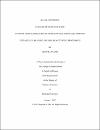IN-DEPTH CHARACTERIZATION OF MESENCHYMAL STEM CELLS-DERIVED EXTRACELLULAR VESICLES USING QUANTITATIVE PROTEOMICS
Abstract
As they home in on injured tissue, modulate the immune system and support tissue repairing, mesenchymal stem cells (MSCs) are considered a promising tool for many therapeutic applications. In vitro, MSCs have been shown to differentiate into multiple cell types mainly of the mesodermal, and more rarely of the endodermal and ectodermal lineage under appropriate conditions. In vivo, however, the beneficial effects mediated by MSCs are mainly attributed to paracrine factors they provide. MSCs are known to secrete large amounts of extracellular vesicles (EVs). EVs are thought to play an important role in intercellular communication, transferring proteins, nucleic acids and lipids to acceptor cells. To identify factors that contribute to the therapeutics roles of MSCs-derived EVs, we characterized the proteins enriched in them. MSCs-derived EVs were isolated from conditioned medium of cultured bone marrow–derived MSCs by ultra-centrifugation steps differentially isolating microvesicles (MVs) and exosomes. We performed LC-MS/MS-based proteomic analysis using reductive dimethylation labeling for quantitation of vesicular proteins against MSC whole cell lysate. In total, we identified 5207 proteins. 4695 and 4386 proteins were quantified in MVs and exosomes, respectively. We further analyzed the up-regulated proteins in both types of vesicles. Functional enrichment analysis was performed and hints at a high contribution of both MVs and exosomes to therapeutic applications of MSCs. EV proteins were linked to broad biological roles including extracellular matrix organization, cell migration, wound healing and hemostasis. Our findings strengthen the idea that MSCs-derived EVs may be a valuable replacement for MSCs in therapy.
DOI/handle
http://hdl.handle.net/10576/5284Collections
- Biomedical Sciences [69 items ]


